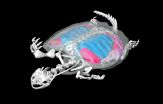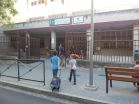Actions versus objects: The role of the motor system
Patients with ALS have difficulty with action-verbs: Why?
2014-11-07
(Press-News.org) Amyotrophic lateral sclerosis (ALS) is a very severe disease that mainly affects the motor system. Recently the focus of public attention thanks to a viral campaign (remember last summer's ALS Ice Bucket Challenge?), ALS leads to progressive paralysis and ultimately death. Among the lesser known symptoms of the disease are cognitive impairments, which may even involve full-blown dementia. One of them is a selective difficulty in understanding and using verbs denoting actions, which these patients find much more challenging to process compared to nouns denoting objects. Scientists hypothesize that the difficulty with this word class depends on the damage to their motor system, which influences the semantic encoding of these words. However, a new study, carried out with the participation of investigators from the International School for Advanced Studies (SISSA) in Trieste, fails to find evidence to support this hypothesis.
"Our idea was to test the performance of ALS patients - and healthy controls - on action-verbs in comparison with nouns denoting objects involved in the same actions as the verbs (e.g., "brush your teeth" and "toothbrush"), rather than nouns denoting any object. And this had not been done before as previous studies had used verbs and objects that were completely unrelated", explains Liuba Papeo, neuroscientist at the CIMeC in Trento and first author of the paper, who started on this research project for her PhD at SISSA.
If the problem with verbs reflected a deterioration of the motor centres, then the tests should also reveal difficulties with the names of objects that imply some action. "In our tests we found better performance on noun processing compared to verb processing. This suggests that the motor deficits and the difficulty with verbs are two distinct aspects, and that there is no direct causal relationship between the two", says Raffaella Rumiati, the SISSA neuroscientist who coordinated the research.
So what causes the language impairment? "It should be stressed that this type of difficulty is most probably not specific to ALS patients. It may be more pronounced in ALS, but it reflects a general tendency of the healthy population, as do most of the neurological syndromes that involve cognitive function. In practice, verbs are more difficult than nouns", continues Papeo. "Our test results show that there is a connection with 'executive function' - that is, the cognitive function involved, amongst others, in the difficulty of tasks".
Executive function in our brain coordinates and plans the execution of complex actions: in addition to purely motor deficits, ALS patients also experience this type of problem. "Our tests revealed that ALS patients fail to retrieve the logical/functional sequence of motor events that make up a complex, purposeful action". And this is precisely the type of disorder that may underlie the language deficit seen in ALS patients. "We now need further investigations to better understand both the executive dysfunction of ALS patients and the role this function has in the semantic encoding of action verbs", concludes Rumiati.
"Cognitive research into ALS may have a real clinical impact," explains Papeo. "The cognitive impairments often manifest before the motor deficits and could therefore be helpful for an early diagnosis, so as to improve as far as possible the quality of life of these patients. Then, should research lead to advances in the treatment of this, so far incurable, disease an early diagnosis could become absolutely critical".
INFORMATION:
The research, published in the journal Cortex, was carried out with the collaboration of the hospitals "Santa Maria della Misericordia" of Udine and "Ospedali Riuniti" of Trieste. The SISSA team included, in addition to Rumiati, also Cinzia Cecchetto.
ELSE PRESS RELEASES FROM THIS DATE:
2014-11-07
This news release is available in German.
How can a sequence of dance steps best be learned? This question was the subject of a project led by researchers from Bielefeld University and the Palucca University of Dance in Dresden, who developed the study along with dancers and dance instructors. Together they researched whether dancers learn a dance sequence better by seeing or by listening, that is, if a dance instructor first demonstrates the sequence, or if he or she first gives a spoken explanation. The research article detailing the results of this study was recently ...
2014-11-07
Through the careful study of modern and early fossil tortoise, researchers now have a better understanding of how tortoises breathe and the evolutionary processes that helped shape their unique breathing apparatus and tortoise shell. The findings published in a paper, titled: Origin of the unique ventilatory apparatus of turtles, in the scientific journal, Nature Communications, on Friday, 7 November 2014, help determine when and how the unique breathing apparatus of tortoises evolved.
Lead author Dr Tyler Lyson of Wits University's Evolutionary Studies Institute, the ...
2014-11-07
Being shown pictures of others being loved and cared for reduces the brain's response to threat, new research from the University of Exeter has found.
The study discovered that when individuals are briefly presented pictures of others receiving emotional support and affection, the brain's threat monitor, the amygdala, subsequently does not respond to images showing threatening facial expressions or words. This occurred even if the person was not paying attention to the content of the first pictures.
Forty-two healthy individuals participated in the study, in which ...
2014-11-07
Last year CERN announced the finding of a new elementary particle, the Higgs particle. But maybe it wasn't the Higgs particle, maybe it just looks like it. And maybe it is not alone.
Many calculations indicate that the particle discovered last year in the CERN particle accelerator was indeed the famous Higgs particle. Physicists agree that the CERN experiments did find a new particle that had never been seen before, but according to an international research team, there is no conclusive evidence that the particle was indeed the Higgs particle.
The research team has ...
2014-11-07
This news release is available in German. Microbiologists and molecular biologists at ETH Zurich and the University of Bonn have discovered a new agent in fungi that kills bacteria. The substance, known as copsin, has the same effect as traditional antibiotics, but belongs to a different class of biochemical substances. Copsin is a protein, whereas traditional antibiotics are often non-protein organic compounds.
The researchers led by Markus Aebi, Professor of Mycology, discovered the substance in the common inky cap mushroom Coprinopsis cinerea that grows on horse ...
2014-11-07
An international research project, which includes researchers from the U. of Granada, has proved the need for campaigns to persuade parents of the benefits involved in having their children walk to school. This also includes work on the perception about the security of the paths their children need to follo won the way to school. This research points out, besides, the need for public administrations to actively campaign to persuade children and their families to walk more often as part of their daily routines.
Many different surveys have demonstrated that walking to school ...
2014-11-07
Since suitable studies are lacking, it remains unclear in which sperm analysis parameters assisted reproduction using intracytoplasmic sperm injection (ICSI) can be superior to in vitro fertilization (IVF). This is the conclusion of the final report published by the Institute for Quality and Efficiency in Health Care (IQWiG) on 6 November 2014.
Benefit assessment depending on parameters
The Federal Joint Committee (G-BA) commissioned IQWiG with the examination of two research questions: First, the researchers were to assess the benefit of ICSI in comparison with IVF ...
2014-11-07
Eribulin (trade name: Halaven) is approved for women with locally advanced or metastatic breast cancer in whom the disease has progressed despite prior drug therapy. The German Institute for Quality and Efficiency in Health Care (IQWiG) examined in a dossier assessment whether the drug offers an added benefit over the appropriate comparator therapy in these patient groups.
According to the findings, there are both positive and negative effects. There is proof of minor added benefit for one group of patients. For other groups, there are hints or indications of lesser ...
2014-11-07
The current classification system for colorectal cancer, which is based on genetic expression profiles, cannot be used to predict drug responses to FOLFIRI. This is the conclusion reached by a team from the Spanish National Cancer Research Centre (CNIO), formed by members from the Gastrointestinal Cancer Clinical Research Unit and the Structural Computational Biology Group. The study, published this week in the journal Nature Medicine, will assist oncologists in making better-informed decisions regarding how to treat their colorectal cancer patients in the clinic.
Conclusions ...
2014-11-07
Published in Nature Biotechnology, the study showed that specially engineered lipid (fat) bodies, called liposomes, can be used to prevent bacterial toxins from killing human cells.
This could prevent unnecessary deaths from diseases such as pneumonia and sepsis. The treatment is a valuable alternative to current medications, particularly for infections that have become resistant to antibiotics.
The bacterial toxins, produced by major human pathogens such as Streptococcus pneumonia, Streptococcus pyogenes and Methicillin Resistant Staphlycoccus aureus (MRSA) were ...
LAST 30 PRESS RELEASES:
[Press-News.org] Actions versus objects: The role of the motor system
Patients with ALS have difficulty with action-verbs: Why?



